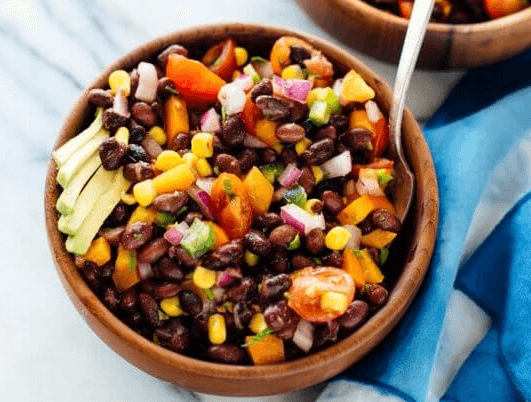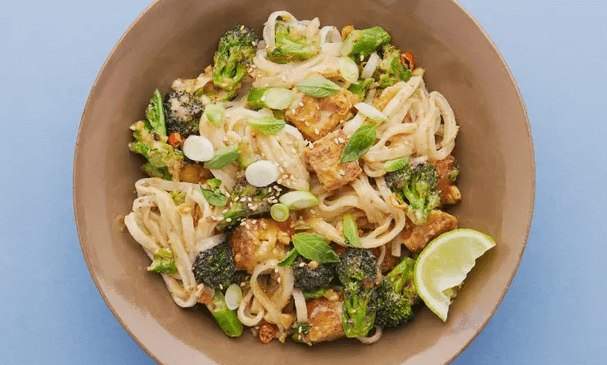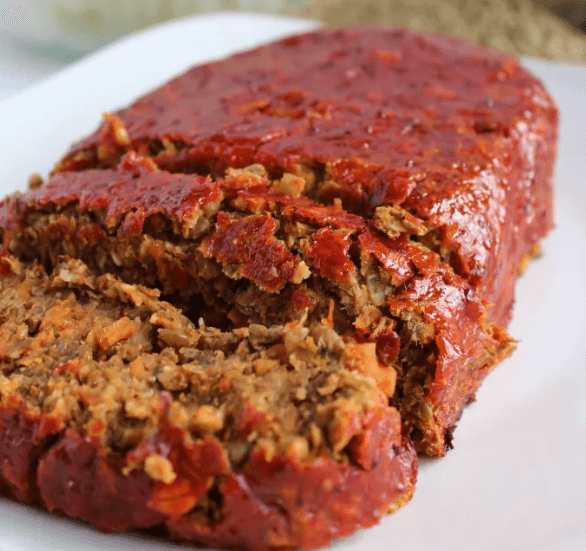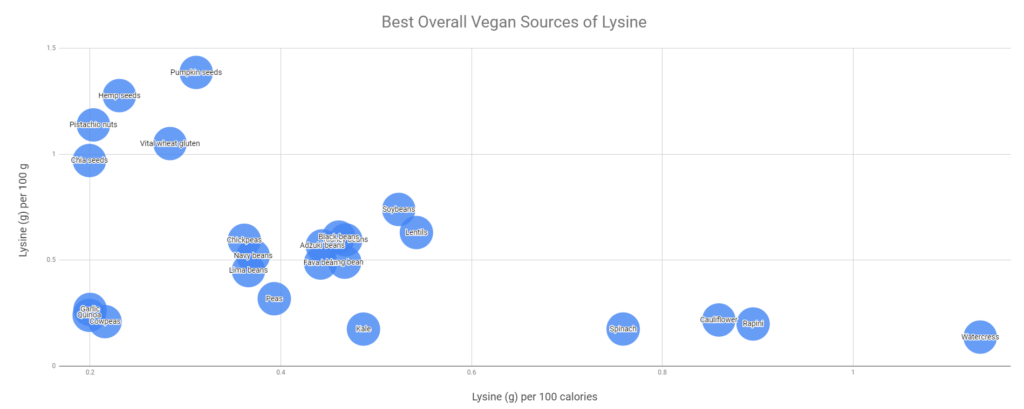Refresher/Summary:
- Lysine is an essential amino acid, meaning the body cannot produce it.
- While meat is a great source of lysine, there are also great plant sources of it.
- Aim for at least 12 mg of lysine per kilogram of bodyweight (or 5.5 mg per lb)
- The best vegan sources of lysine are legumes, nuts, seeds, and leafy greens.
Lysine is one of the most important amino acids for vegans, and also more difficult to get once you’re on a vegan diet.
I’ve put together a thorough list of the vegan foods that are highest in lysine. First by the amount per serving and calorie, then by the amount per 100 grams.
Table of Contents
How Much Lysine Do You Need?

Lysine has a few important roles:
- It is especially important for athletes, as it plays a big part in all types of protein synthesis.
- It’s also needed to absorb calcium and to make collagen, both of which are important for overall bone and joint health.
- Research has shown that consuming a high ratio of lysine to arginine can prevent cold sores. If you’re interested in the foods best for that, see my list of the best high lysine low arginine vegan foods.
For reference, there’s no official recommended daily amount for lysine, but literature usually recommends around 12 mg per kilogram of bodyweight.
For someone who is 77 kg (170 lb), that’s 924 mg of lysine per day. As you’ll see, it’s easy to get that in a single serving of certain foods. If you want to track how much you’re getting, use a free tool like Cronometer.
The Best Overall Vegan Sources of Lysine
You can see tables of the best vegan foods for lysine per serving, 100 calories, and 100 grams in the sections below.
But, I think a bubble chart really helps to visualize which sources are the best.
It compares the amount of lysine per 100 grams, and per 100 calories. The foods that rise towards the top right corner are the most “efficient”, meaning that it’s easy to get a lot of lysine from them without eating a ton of food or calories.
(Click the chart to enlarge)
There are 3 big clusters:
- All the legumes are clustered near the middle. They have a good balance between the 2 measurements.
- Leafy greens like watercress and spinach tend towards the bottom right. They have a lot of lysine per calorie, but not much per gram, meaning you have to eat a lot of them to get a lot of lysine.
- Nuts and seeds cluster towards the top left (along with vital wheat gluten for some reason). They have a lot of lysine, but also come with a ton of calories, so they’re not great if you’re trying to lose weight.
The Top Vegan Lysine Sources Per 100 Grams
I’ve been told that some of my serving sizes are a bit…weird.
So, I included the table below that uses the standard comparison on a per 100 grams basis.
| Food | Lysine per 100 grams |
|---|---|
| Seaweed (dried) | 3.03 |
| Pumpkin seeds | 1.39 |
| Hemp seeds | 1.28 |
| Pistachio nuts | 1.14 |
| Vital wheat gluten | 1.05 |
| Chia seeds | 0.97 |
| Peanuts | 0.93 |
| Flaxseed | 0.86 |
| Cashew | 0.82 |
| Soybeans | 0.74 |
| Oats | 0.70 |
| Lentils | 0.63 |
| Black beans | 0.61 |
| Buckwheat groats | 0.60 |
| Kidney beans | 0.59 |
| Chickpeas | 0.59 |
| Sesame seeds | 0.57 |
| Almonds | 0.57 |
| Adzuki beans | 0.57 |
| Pine nuts | 0.54 |
| Navy beans | 0.52 |
| Brazil nut | 0.49 |
| Mung bean | 0.49 |
| Fava bean | 0.49 |
| Lima beans | 0.45 |
| Walnut | 0.42 |
| Hazelnut | 0.42 |
| Peas | 0.32 |
| Pecans | 0.29 |
| Rye grain | 0.29 |
Legumes still score well, so you should be including them in your diet.
However, seeds and nuts really rise up the list. They have a lot of lysine per weight, so it’s easy to get a lot from them, but you’ll also get a lot of calories at the same time, so it’s a trade-off.
The Best Vegan Lysine Food Sources Per Serving and Per 100 Calories
When I collected this data, which comes straight from the USDA food composition database, I chose “reasonable” serving sizes to make the data useful.
In all, I collected nutritional data for over 120 whole foods, and these were the top 30 for lysine:
| Food | Serving | Lysine (g) | Lysine (g) per 100 calories |
|---|---|---|---|
| Soybeans | 1 cup | 1.33 | 0.52 |
| Adzuki beans | 1 cup | 1.304 | 0.44 |
| Lentils | 1 cup | 1.247 | 0.54 |
| Oats | 1 cup | 1.094 | 0.18 |
| Kidney beans | 1 cup | 1.053 | 0.47 |
| Vital wheat gluten | 100 g | 1.05 | 0.28 |
| Black beans | 1 cup | 1.046 | 0.46 |
| Mung bean | 1 cup | 0.99 | 0.47 |
| Buckwheat groats | 1 cup | 0.976 | 0.17 |
| Chickpeas | 1 cup | 0.973 | 0.36 |
| Navy beans | 1 cup | 0.946 | 0.37 |
| Pumpkin seeds | 1 cup | 0.887 | 0.31 |
| Fava bean | 1 cup | 0.826 | 0.44 |
| Lima beans | 1 cup | 0.765 | 0.37 |
| Pistachio nuts | 0.5 cup | 0.7 | 0.20 |
| Peanuts | 0.5 cup | 0.676 | 0.16 |
| Spinach | 1 bunch | 0.592 | 0.76 |
| Cashew | 0.5 cup | 0.56 | 0.14 |
| Rye grain | 1 cup | 0.483 | 0.08 |
| Swiss chard | 10 leafs | 0.475 | 0.52 |
| Peas | 1 cup | 0.46 | 0.39 |
| Quinoa | 1 cup | 0.442 | 0.20 |
| Sesame seeds | 0.5 cup | 0.41 | 0.10 |
| Hemp seeds | 3 tbsp | 0.383 | 0.23 |
| Pine nuts | 0.5 cup | 0.365 | 0.08 |
| Cowpeas | 1 cup | 0.345 | 0.22 |
| Brazil nut | 0.5 cup | 0.326 | 0.07 |
| White potato | 1 large | 0.321 | 0.13 |
| Almonds | 1/2 cup | 0.307 | 0.10 |
| Chia seeds | 3 tbsp | 0.291 | 0.20 |
Want lots of lysine? Eat plenty of legumes.
Just about all the top results are different types of beans (soy, adzuki, kidney, black), plus lentils.
Oats and seeds (pumpkin, sesame, hemp) are also good sources, but not quite as good.
While nuts have some lysine, their essential amino acid profiles are typically low in lysine.
Vegan Recipes High in Lysine
It’s not hard to get a lot of lysine, pretty much any meal with beans in it will have a bunch.
Going forward, think about the following types of meals if you’re trying to get more lysine:
- Bean salads
- Chilis and stews
- Bean or lentil “loafs”
- Stir frys with beans and spinach
- Anything with a nut sauce (tofu with peanut sauce is common)
Here are a few recipe links to some of my all time favorites that have a bunch of lysine.
Fresh Black Bean Salad

I remember this recipe so well as it was one of the first things I made after going vegan, and I’ve made it several times since.
It’s easy to make and is packed with blacked beans. I also like to add hemp seeds and chia seeds, which incidentally adds more lysine.
Peanut and Broccoli Pad Thai

Soybeans are the best vegan source of lysine, so tofu-based recipes contain quite a bit of the amino acid.
In addition, the peanut sauce is not only delicious, but adds a decent amount of lysine as well.
Mushroom Lentil Loaf

This plant-based “meatloaf” alternative combines 2 of the best sources of lysine: lentils and oats.
It’s a very well-rounded and filling meal that can especially help if you ever have any meat cravings.
Other Hard to Get Amino Acids for Vegans
If you’re interested in lysine, you might be interested in the best plant-based sources of these other amino acids:


Thanks for the post! Very helpful to have on hand.
No problem Adam.
Thanks. For us vegan math challenged how much of say 1 cup of black beans do we need to eat to get 924mg? How do I calculate?
Darcie
1 cup of cooked black beans is ~172 grams, depending on the brand, so just a bit under that.